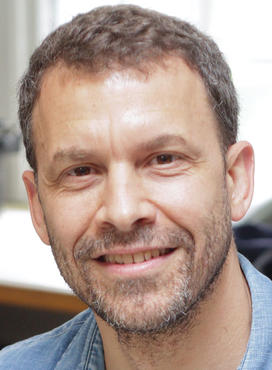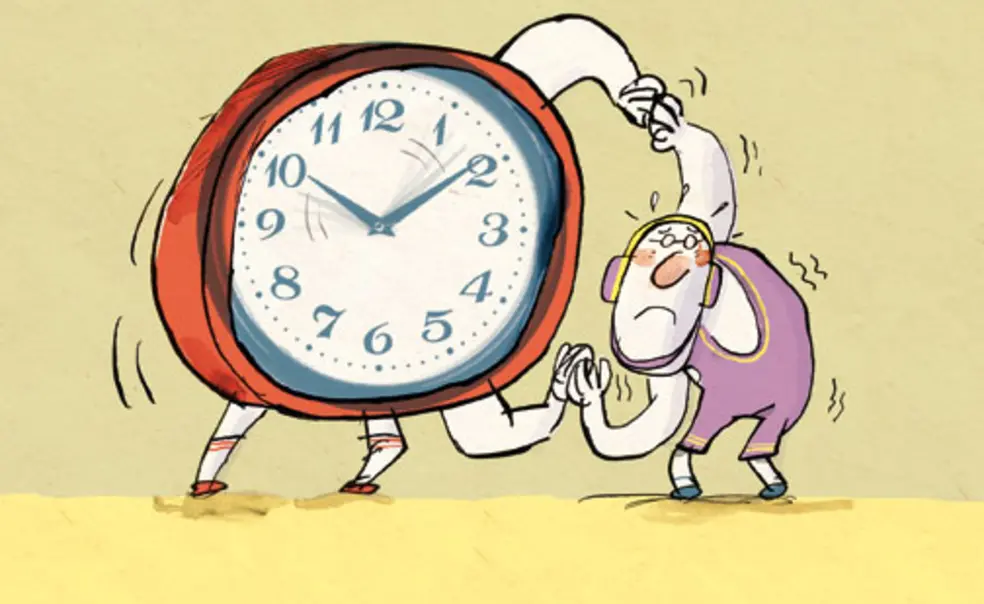My younger self: Wrestling with the passage of time
Not too long ago, I showed up for wrestling practice at my old high school. I blame it on my approaching 25th Princeton reunion, this desire to visit the glory of my youth.
My wife had insisted I call the coach first to see if it was OK. “There may be laws against this,” she said. Coach informed me that it was quite common for some of the old guys to drift back.
The practice room had not changed at all. It was still a small box of a room with wall-to-wall mats and a heavy-duty heater pumping the temperature up to more than 80 degrees. I broke a sweat just standing by the door.
For a moment I stared. In front of me a group of young boys — what else could they be called? — lounged about on the mat. I caught them eyeballing me out of the corner of their eyes. I was no mere visitor checking out the scene. No, I was dressed for battle, wearing a gray T-shirt, gym shorts, even tattered headgear and kneepads I had dug out of the closet.
Then I saw him: a kid who could be my younger self, only taller and tougher-looking.
The boy had shoulders wide as a clothesline and arms so muscular they appeared misshapen. He wore a crew cut and had a lean, square face. The boy looked hungry, too. He pumped out push-ups while the other kids relaxed. There was a rope hanging from the ceiling and he climbed it hand over hand, not using his legs at all, while the other kids chatted mindlessly. He practiced moves in front of a mirror and then again among more hanging ropes, bobbing and weaving like some Tarzan among the vines.
I thought back to my own time on the team. As a young wrestler I had run several miles each evening while carrying a brick in each hand. By the end of each run my biceps bulged large as summer squash. Once, a cop cruising by had stopped to investigate. When I told him why I was carrying two bricks while running late at night he nodded, then told me how when he was in high school he played football. Every morning he woke before dawn, went out to the garage, and for an hour pounded a spare tire with a sledgehammer. The cop shook my hand and sent me on my way.
“Bill,” the coach said, waking me out of my daydream. “Glad you could make it.” He shook my hand so vigorously I felt something give way in my shoulder. I smiled extra wide to hide my grimace.
“Wouldn’t have missed it for the world,” I said, looking past the coach toward my younger self — surely, my partner for the afternoon.
But Coach nodded and pointed to the far side of the room, where a sad-looking boy sat slumped against the mat. His face was buried in his knees. Mostly, just his hair was visible.
“That’s your partner over there,” Coach said. “His name is Stash.”
“You’ve got to be kidding me,” I said.
Coach looked at me closely. “You’re here to help out, right? Well, that kid needs a lot of help.”
When Coach blew the whistle again, we squared off against our opponents. Stash did not in any way resemble the fantasy of my youth. Instead, he appeared more like the man I had become. I did not like what I saw.
Stash was weak and out of shape. He was also tentative, all backward and sideways movements. I peeked over at my true younger self. He was in the act of lifting his partner high in the air. It was effortless.
I turned back to Stash, sighed, then went to work.
I started by feinting to the left; then, after Stash had taken the bait, I ducked under his right arm. It was an old move, something basic but well loved because of its success rate. But my muscle memory had developed Alzheimer’s, it seemed. My ankles crossed, and I fell to the mat. I did not fall like my younger self did, though, when the body simply went with the flow, turning a potential accident into a beautiful forward roll. No, I fell like an old man: hard and fast onto my side. I broke two ribs.
The pain of breaking a rib is not so intense at the moment it happens. There is a searing sensation, along with a slight giving way. But quickly the pain builds until it is as if a nest of very angry bees has taken root inside your body.
I rose to my feet, holding my side and wheezing slightly.
“Are you OK?” Stash asked.
“Yeah, fine,” I said. “Just give me a minute.”
If this story were fiction, perhaps now would be the moment a lesson would be imparted. Some detail of self-knowledge gained, and acceptance of my status in life. Or maybe I would shower some wisdom on young Stash that would help him navigate the often-cruel labyrinth of high school. Real life never comes in such neat packages, though. Instead, I just gutted it out.
Practice lasted two hours. That’s two hours of falling to the mat and having various kids squeezing my waist hard. It hurt like hell — but to have left practice, to have called it quits and walked out the door, would have hurt even more.
I never did get to wrestle my younger self that day. He stayed on the opposite side of the room. During breaks, seated on the mat, and leaning up against the wall, I watched him practice. I could take in only small breaths due to the pain in my ribs, and sweat poured so heavily down my face it was as if I were melting. Stash, who by now had become talkative, sat next to me narrating the story of his life. It wasn’t that unpleasant.
At one point I closed my eyes, changed the channel, and saw the stretch of my own life, including Princeton and meeting my roommates for the first time. It all seemed so unreal, this passage of time. Surely I still was just graduating from high school and wondering what the future would bring — but not afraid, because I was young and strong and the boundaries of my life felt defined, like the circle around the wrestling mat.
But of course this wasn’t the case. That was more than 25 years ago, both a blink in time and a period so full of change and growth that to take it all in at once felt impossible. I turned to Stash, wanting for a moment to tell him my life story. But where to begin, what to include, and how much of it would just bore or frighten him? After all, the journey to middle age might be best summed up by the word “messy.” There really is no other way to describe the enormity of change, both good and bad, that happens as the years accumulate. I would not have it any other way.
And so I stayed quiet and instead shifted my glance to the future, wondering what the next 25 years might hold. The only certainty I saw there was that my wife would have to help me out of bed for the next month.

Bill Eville ’87 is the arts and features editor of the Vineyard Gazette on Martha’s Vineyard.












No responses yet